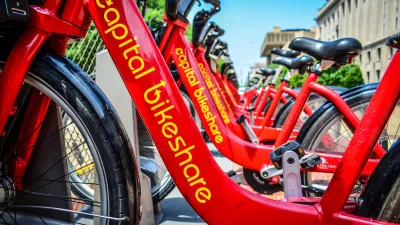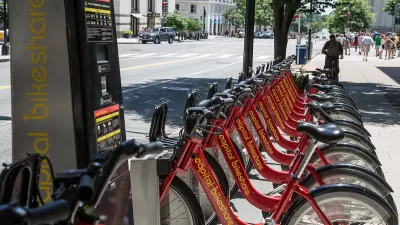What makes Capital Bikeshare, the largest such program in the U.S. with nearly 2000 bikes, a success? What are its shortcomings? Mohana Ravindranath investigates.
From its user friendliness to its business plan, Ravindranath takes a close look at how D.C.'s Capital Bikeshare, the largest bike sharing system in the country, operates.
Ravindranath provides a first-hand view into how individual members interact with the system, its successes and failures.
With 22,000 active members annually, Capital Bikeshare has seen an increase in 24-hour memberships and a decrease in annual and 3-day access demand.
This could be in part because regular users prefer to purchase their own bicycles for added flexibility in their schedules. Users at many of the District's busy stations, especially downtown, find that they cannot always find available bikes during peak hours or that docking space is not always available.
To maintain the system, D.C., Arlington County and the City of Alexandria in Virginia operate a bike redistribution service, call center and a website.
Last year, Arlington County was able to recover its costs completely with left-over revenue, while D.C., with operating costs of $54,000 per station, just fell short of cost recovery. There is no data yet for Alexandria, which joined the program less than a year ago. Montgomery County in Maryland plans on joining the fray with 50 new stations.
FULL STORY: The business of bike sharing

Planetizen Federal Action Tracker
A weekly monitor of how Trump’s orders and actions are impacting planners and planning in America.

Maui's Vacation Rental Debate Turns Ugly
Verbal attacks, misinformation campaigns and fistfights plague a high-stakes debate to convert thousands of vacation rentals into long-term housing.

Restaurant Patios Were a Pandemic Win — Why Were They so Hard to Keep?
Social distancing requirements and changes in travel patterns prompted cities to pilot new uses for street and sidewalk space. Then it got complicated.

In California Battle of Housing vs. Environment, Housing Just Won
A new state law significantly limits the power of CEQA, an environmental review law that served as a powerful tool for blocking new development.

Boulder Eliminates Parking Minimums Citywide
Officials estimate the cost of building a single underground parking space at up to $100,000.

Orange County, Florida Adopts Largest US “Sprawl Repair” Code
The ‘Orange Code’ seeks to rectify decades of sprawl-inducing, car-oriented development.
Urban Design for Planners 1: Software Tools
This six-course series explores essential urban design concepts using open source software and equips planners with the tools they need to participate fully in the urban design process.
Planning for Universal Design
Learn the tools for implementing Universal Design in planning regulations.
Heyer Gruel & Associates PA
JM Goldson LLC
Custer County Colorado
City of Camden Redevelopment Agency
City of Astoria
Transportation Research & Education Center (TREC) at Portland State University
Jefferson Parish Government
Camden Redevelopment Agency
City of Claremont





























